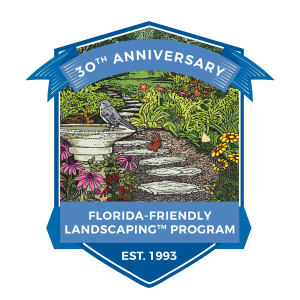 Join us in celebrating 30 years of Florida-Florida Friendly Landscaping™ this blog series. Since 1993, Florida-Friendly Landscaping™ has served as the state of Florida’s premier Extension program that promotes sustainable alternatives to “conventional” landscaping, providing guidance on low impact, environmentally friendly, science-based landscape practices that use less water and reduce pollutant loading to Florida waters. In this series, you will learn:
Join us in celebrating 30 years of Florida-Florida Friendly Landscaping™ this blog series. Since 1993, Florida-Friendly Landscaping™ has served as the state of Florida’s premier Extension program that promotes sustainable alternatives to “conventional” landscaping, providing guidance on low impact, environmentally friendly, science-based landscape practices that use less water and reduce pollutant loading to Florida waters. In this series, you will learn:
1. Five FFL Facts to Know to Help you Grow
2. What’s the Word? Five FFL Terms to Know
3. Take Some Action in Five Simple Steps!
4. Five Steps to Become a Florida Friendly Landscaper
5. Five Ways to Know You are a Florida-Friendly Follower
Before you get started with anything, it is important to have some background information. Let’s learn a little bit about Florida-Florida Friendly Landscaping™ to get you growing!
- Florida-Florida Friendly Landscaping™ (or FFL) is a partnership between the University of Florida Extension services and the Florida Department of Environmental Protection. The purpose of this program is to promote sustainable landscaping practices and is composed of 9 research-based principles (or actions) that Florida residents can take to create beautiful and healthy landscapes. The nine principles are listed below.
- One of the main goals of FFL is to protect Florida’s water resources. A key objective is to retain water (mainly rainfall) on your own property so it can filter through the soil into our underground aquifers. Why is this important? Florida’s increased urban development has resulted in an upsurge of roadways, rooflines, driveways and sidewalks. These impervious surfaces cause water to rush over them, taking along nutrients from fertilizers and other chemicals that end up as pollution in our lakes, rivers, bays and other water resources.
- FFL promotes actions residents can take to properly apply fertilizer and pesticides. FFL teaches WHEN, WHICH, IF and HOW to approach the use of chemicals in your landscape. The happy results of proper application include:
- reducing pollution
- decreasing exposure of chemicals to humans, pets and wildlife
- promoting better health of our landscape plants
- saving money
- FFL promotes plant diversity. Landscapes with a diversity of trees, shrubs, grasses, and perennials have many benefits, including:
- increased areas of rainfall absorption
- increased beauty and visual interest in the landscape
- provision of shelter and nourishment for our native birds, pollinators, and other small wildlife
- FFL offers a wealth of knowledge on landscaping topics! Best yet, these resources are easily accessible in many formats for Florida residents. Whether your search takes you to printed materials, online sources, local in-person events, or contacts with staff of UF/IFAS Extension and/or the Master Gardener Volunteers, you’ll be sure to find informative and inspiring ideas on how to create a Florida-Friendly Landscape!
Resources:
Here is the website for FFL in Polk
Florida-Friendly Landscaping(tm) Guide to Plant Selection & Landscape Design
For more information, contact UF/IFAS Extension Polk County at (863) 519-1041 or visit us online at http://sfyl.ifas.ufl.edu/polk. The Plant Clinic is open Monday-Friday, 9:00 am-4:00 pm to answer your gardening and landscaping questions. Give us a call or email us at polkmg@ifas.ufl.edu.
If you are not in Polk County, Contact your local UF/IFAS Extension Master Gardener Volunteer Plant Clinic.
The Florida Master Gardener Volunteer Program is a volunteer-driven program that benefits UF/IFAS Extension and the citizens of Florida. The program extends the vision of the University of Florida/Institute of Food and Agricultural Sciences, all the while protecting and sustaining natural resources and environmental systems, enhancing the development of human resources, and improving the quality of human life through the development of knowledge in agricultural, human and natural resources and making that knowledge accessible.
This article was written by Master Gardener Volunteer Molly Griner under supervision of the Master Gardener Volunteer Coordinator and Residential Horticulture Extension Agent Anne Yasalonis.
An Equal Opportunity Institution.
 0
0
